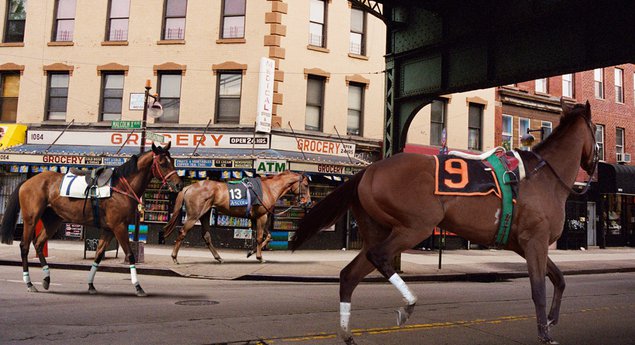New Horse-Racing Initiative Aimed At Training Thoroughbreds From Inner City
DECEMBER 10, 2010

COMPTON, CA—In an effort to develop a more diverse base of athletic talent, raise the sport’s profile in nontraditional areas, and enrich the lives of troubled youth, thoroughbred-racing organizations are funding a new program to train inner-city and delinquent horses.
The initiative, known as Right Side of the Track, is opening 12 “Colts & Fillies Clubs” in impoverished urban locales across the country, and already has four operational centers in Detroit, Baltimore, Birmingham, and St. Louis. According to organizers, the facilities will provide at-risk yearlings and disadvantaged foals with free access to state-of-the-art running tracks, experienced trainers and jockeys, and, depending upon their behavior, sugar cubes.
“We want young thoroughbreds to know that there are other opportunities out there, that there are better things to do than gallop the streets looking for trouble,” Right Side of the Track president Hanson Jennings said Sunday at the opening of the Compton Colts & Fillies Club. “These horses need structure, and they need a safe place to go during the day or they’ll wind up in the wrong herd.”
“Take Afternoon Delight here,” added Jennings, referring to the 18-hand Appaloosa standing next to him. “One year ago he was a young-punk pony living on the streets of Baltimore with no future ahead of him. But because of our mentoring program, his confidence is growing, his outlook is far more positive, and he raced last year in several events. He still has some anger issues, especially around dogs, but he hasn’t bitten a human in over seven months.”
Though locales such as Baltimore and Louisville have world-class racetracks, the horses that compete there are not bred inside the city limits. Walk around a tough neighborhood in most parts of the country, horse-racing officials said, and you’re unlikely to see young equines on the street wearing fancy horseshoes or race-quality silks. Many are so apathetic and unmotivated they find it acceptable to meander around in public covered in mud and their own filth.
Just last Thursday, 8 urban horses allegedly broke into a Detroit veterinary hospital to get a ketamine fix.
“Let’s face it: Horse racing is for the privileged few, the kind of thoroughbreds who never had to worry about where their next bale of hay was coming from, or whether their owner would be around to braid their mane for a big race,” volunteer jockey Jeff Sherman said. “But there is a lot of raw talent at these centers. They need only look at Mine That Bird, who won the 2009 Kentucky Derby even though his absentee father was too busy running around with fillies and siring yearlings all over the country to pay any attention to him.”
Right Side of the Track has recruited a number of trainers with professional experience to face the unique challenge of working with underprivileged horses. After a life on the streets, they said, colts can become hardened and aggressive, refusing to take orders or to be saddled by an authority figure.
“You get these horses, and they trot and whinny in a certain way that says, ‘I will kick the shit out of you if given the chance,'” said world-renowned trainer Bob Baffert, who admitted that he always carries his crop with him when he walks through bad neighborhoods at night. “They’re a little unsure of you at first, but once they realize you trust them to eat an apple out of your hand, they nicker a little bit and you know you have them.”
Efforts to involve the community have also been successful. In each of its four locations, the organization has found groups of retirees willing to volunteer their time by attending races and cheering on the young amateurs during races. However, while some program participants do ultimately become world-class racehorses, organizers said that isn’t the main goal of the clubs.
“Our mission is to broaden their horizons,” Jennings said. “Even if they don’t go on to race professionally, urban horses need to know there are other paths for them out there. If they dedicate themselves, they can train to do police work. They can learn to round up cattle. They can even go on to work with kids in 4-H.”
“There are alternatives,” he stressed, “and if they don’t realize that, they’ll just end up on the streets, begging for oats.
from the onion